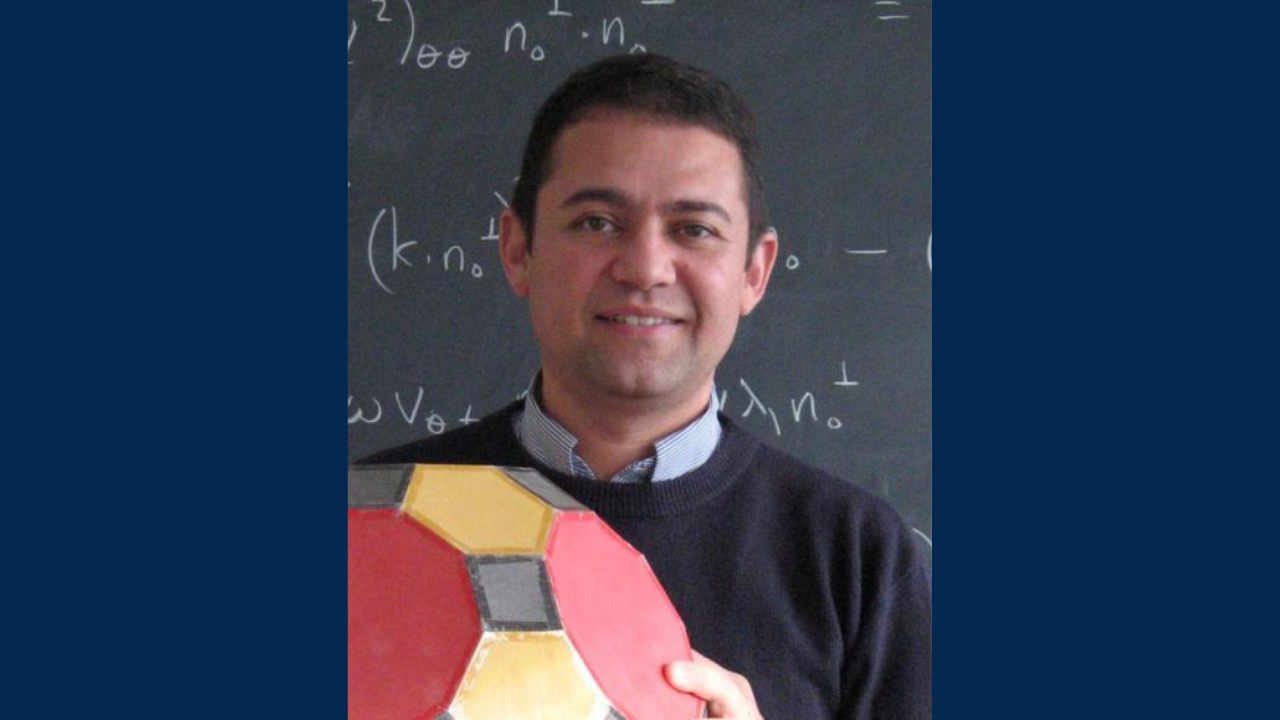
Many people can pinpoint a time in their lives when a leader helped define their trajectory. For UC Davis Professor of Mathematics Jesús De Loera, that moment occurred during his middle school years in Mexico, and that person was a mathematics teacher.
“She changed my life in the sense that she really introduced me to mathematics and promoted my interest and ability in the subject,” said De Loera, an applied mathematician specializing in discrete structures.
For more than 25 years, De Loera has taken that lesson in enthusiasm and paid it forward to UC Davis students and beyond. In honor of his commitment to mentorship, the Mathematical Association of America has honored De Loera with the T. Christine Stevens Award for Leadership Development. The award recognizes the importance of professional development that seeks to build leadership capacity within the mathematical sciences.
“It was a pleasant surprise,” De Loera said of receiving the award. “I have been doing a lot of mentoring both on and off campus for years, but I didn’t even know I was being nominated. So it was a bit of a surprise.”
A career dedicated to uplifting others
When he joined the UC Davis faculty in 1998, De Loera committed himself to increasing inclusivity in the mathematical sciences.
When he was chair of the Applied Mathematics Graduate Group, he advocated for and implemented a more holistic admissions process, reducing reliance on standardized tests and committing to fostering diversity. Additionally, he collaborated with other mathematicians to create the Latinx Math Network Workshops, an event series that provides a platform to discuss the needs of the Latinx and Hispanic mathematics community. He also was a faculty mentor for the Chicanx and Latinx Engineer and Scientist Society at UC Davis, which is dedicated to fostering an environment conducive to academic, professional and social success.
On the national level, De Loera is a member of the American Mathematical Society’s Committee on Education and a member of the Transforming Post-Secondary Education in Mathematics program, which aims to promote minority-focused mathematics education reform.
“I’m very committed to increasing the representation of Chicanx and Latinx in math,” said De Loera, noting that he wants those demographics to better represent the demographics of the state of California. “We are the University of California because we belong to the people of California. We are here to serve all Californians.”
De Loera’s exemplary mentorship has been honored with various UC Davis awards, including the UC Davis Achievement Award for Diversity and Community, the College of Letters and Science Distinguished Teaching Award and a Chancellor’s Award for Excellence in Undergraduate Mentoring Research, among others.
While he’s enthusiastic about awards, the honors come second to the lives De Loera influences daily. This year marked the 20th graduate student that’s finished a doctoral thesis with De Loera. He’s mentored over 60 undergraduate students through their senior thesis projects.
“I consider them to be my greatest achievements and I’m very proud,” he said.
Math in the everyday

For De Loera, mathematics is just as important as reading. It’s something that every member of society should be able to harness, he said.
“Math is beautiful but the incredible thing is not only is it beautiful, it also has a lot of applications,” De Loera said. “For example, the Internet wouldn’t exist without mathematics, artificial intelligence cannot exist without mathematics, all of these technological developments that we use are based on a mathematical model or mathematical method.”
De Loera doesn’t just try to highlight this to his students, his research is directly related to applying mathematical models to real-world problems. One area of his research concerns convex polytopes—geometric shapes with a finite number of points.
“These objects are beautiful; they look like jewels,” De Loera said. “I studied them on their own as a mathematical object, but I also like to use them to do applications of various kinds.”
One use example is the commercial aviation industry. An airline company needs to make an innumerable number of decisions concerning pilot and crew assignments, route assignments, plane allocation and fuel estimates, to name a few.
“The numbers are so large that it cannot be done by a person by hand,” De Loera said. “It has to be done by a computer and the computer programs that make these assignments use these mathematical objects. The shape essentially classifies all the possible answers.”
That aviation industry is a tangible example of how mathematics impacts society every day. De Loera wants to continue highlighting such examples to showcase the importance and necessity of math.
